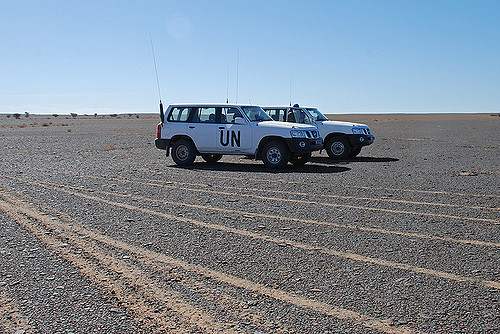Updated
Western Sahara: MINURSO Options – Robert M. Holley

MINURSO forces in Western Sahara Photo: Teresa Marin
Robert M. Holley
July 25, 2018
I have heard a lot of oddly crazy options over the last 18 months about the future of MINURSO, the United Nations peacekeeping mission for Western Sahara. I say oddly crazy because some of them I heard directly from acknowledged experts on North African affairs.
When the Security Council renewed MINURSO’s mandate last April for only six months it raised my suspicion that some of these ideas could well be under consideration when the Council decides on the renewal of the mandate in October.
Perhaps the craziest idea I heard was the suggestion that MINURSO should just be eliminated entirely. That the Security Council should recognize that the mission has failed in its original task to keep the peace while organizing a referendum on the future of the territory and should be either eliminated entirely or redesigned for some new, as yet, unspecified purpose.
Nearly everyone agrees that the original effort to organize a referendum was a total failure despite eight years of trying to secure agreement on the most fundamental question of who should be allowed to vote. Following that, the United States led an effort to transform the mission into a search for some kind of compromise political solution. That effort has been underway since early 1999 with no better result. This understandable frustration with a continuing failure seems likely to be behind the sentiment of some to simply eliminate MINURSO and move on.
But if “move on” becomes the order of the day, it begs the question – move on to what?
The Security Council could, of course, simply eliminate MINURSO, but unless the Council also decides to abandon the issue and declare itself no longer “seized” of the matter, the Council will need to put something in MINURSO’s place to continue to manage its effort to promote a “mutually acceptable political solution” to the problem.
The Council could eliminate MINURSO and still remain seized of the matter and continue to endorse the activities of the Secretary General’s Personal Envoy to bring the Parties to agreement on a mutually acceptable political solution. Meaning, the Personal Envoy would be on his own in this effort without the MINURSO support mechanism to provide him information about developments on the ground or any “blue helmets” to monitor and report on the military activities of the various Parties to the dispute. Given the increased tensions of the last year in the buffer zone and continued threats of renewed hostilities, this is probably not a very good idea.
Optionally, the Council could also choose to keep the “blue helmets” in place under the MINURSO label, or some new moniker, while at the same time substantially curtailing the civilian contingent of the current mission. This would likely please Morocco and enrage Algeria and Polisario. The Moroccan view has long favored a reduction in MINURSO’s civilian staff, which they see as exceeding its mandate in becoming involved in political issues, including human rights reporting. Algeria and Polisario, on the other hand, have long sought to expand the mission of the civilian contingent to include not only human rights reporting, but to empower it as a political broker for contentious issues on the ground. This argument among the Parties briefly resulted in Morocco expelling most of the civilian contingent and then, under pressure from the Obama Administration, quietly allowing most of them to return. The Council then vaguely endorsed the political utility of the mission’s civilian contingent in the last MINURSO mandate renewal during the Obama years and the matter has remained a source of quiet disagreement ever since. This month MINURSO’s budget was renewed with a slight reduction of funding, but the definition of the mission’s core responsibilities was left unaddressed. Waiting for October?
It is not a secret that the Republican Party in the United States has a substantial contingent of its supporters who are openly critical, not to say hostile, to the United Nations in general and to UN peacekeeping missions in particular. This opposition is largely defended on the basis of cost effectiveness and lack of mission accomplishment in the various UN peacekeeping operations around the world. Given the lack of accomplishment of the MINURSO mission, it is not surprising that it is often referred to as a poster child for these objections and frequently mentioned, especially under the current US leadership, as an inviting target for cuts.
But let’s be honest, the lack of effectiveness of the MINURSO mission has less to do with the mission’s design and currently stated purpose and, as I argued in my previous blog on this subject last week, and everything to do with the preference of Security Council member states for maintaining status quo rather than make more decisive choices to break the logjam.
So what is likely to happen in October? Will the enthusiasm for cost cutting drive the future of MINURSO or will there be some incremental compromise that reduces expenses but leaves the mission in place without any major adjustment of its duties and responsibilities? Will the preference for doing nothing to upset the status quo, i.e., a continuing stalemate, prevail once again or will the Council reverse course and decide on more decisive action?
Some years back, James Baker threatened the Council with his resignation unless it decided to take a more decisive position in support of his efforts. Indeed, Baker also floated the idea of moving the issue out of Chapter VI of the UN Charter and dealing with Western Sahara under Chapter VII, meaning the Council could take actions to oblige the Parties to accept a solution rather than simply encourage them to find one they could all agree to on their own. The Council refused to endorse Baker’s suggestions and he eventually resigned. Have we come full circle three Personal Envoys later?
What is clear is that everyone is looking forward to Mr. Kohler’s next report. Will he be as candid as Mr. van Walsum in his last report to the Council? That resulted in Algeria and Polisario refusing to speak with him afterwards. Or, will he continue to simply cajole and encourage the Council to take a firmer stand “in the spirit of realism,” leaving the Council another opportunity to simply kick the can down the road again?
As important as Kohler’s conversations with the Parties certainly are, I would argue that his conversations with the most important Security Council members are every bit as critical, if not more so. The logjam on Western Sahara is not going to be broken until the United States, and others on the Council, decide to take some risks and make more decisive choices.
I guess we all stay tuned. October should tell us something important one way or another.
